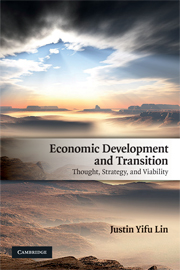Book contents
- Frontmatter
- Contents
- List of figures
- List of tables
- Preface
- 1 Development, transition and divergence
- 2 The search for a fundamental and changeable cause of prosperity
- 3 Aspirations and social thought of modernisation
- 4 Development strategy, viability and performance
- 5 Viability and strategies of transition
- 6 Development strategy, development and transition performances: empirical analysis
- 7 Why are east Asian economies so special? Are there any general lessons to be learnt from east Asian development and transition experiences?
- 8 Towards a right development and transition strategy
- Appendix 1 Development strategy and economic institutions in developing countries
- Appendix 2 Data description
- References
- Index
3 - Aspirations and social thought of modernisation
Published online by Cambridge University Press: 05 June 2012
- Frontmatter
- Contents
- List of figures
- List of tables
- Preface
- 1 Development, transition and divergence
- 2 The search for a fundamental and changeable cause of prosperity
- 3 Aspirations and social thought of modernisation
- 4 Development strategy, viability and performance
- 5 Viability and strategies of transition
- 6 Development strategy, development and transition performances: empirical analysis
- 7 Why are east Asian economies so special? Are there any general lessons to be learnt from east Asian development and transition experiences?
- 8 Towards a right development and transition strategy
- Appendix 1 Development strategy and economic institutions in developing countries
- Appendix 2 Data description
- References
- Index
Summary
Without the establishment of heavy industries in China, there can be no solid national defense, no well-being for the people, no prosperity and strength for the nation.
Mao Zedong (1945)No country can be politically and economically independent, even within the framework of international interdependence, unless it is highly industrialized and has developed its power resources to the utmost.
Jawaharlal Nehru (1946)Keynes (1926: 16) writes, ‘[A] study of the history of opinion is a necessary preliminary to the emancipation of the mind.’ In this chapter, I review the evolution of social thought regarding the role of the government in the industrialisation and transition of developing countries.
Before the Industrial Revolution in the eighteenth century, China was more industrialised than the West (Cipolla, 1980; Elvin, 1973; Jones, 1981; Needham, 1969). In the seventeenth century the Indian subcontinent was not significantly less developed than Britain and, before 1800, India was a major supplier of cotton and silk textiles in international markets, including to Europe (Dutt, 1992). After the Industrial Revolution in Britain in the mid-eighteenth century, and in western Europe in the nineteenth century, the West was quickly industrialised and enhanced its economic, military and political power to achieve a dominant position in the world – hence the great divergence between the industrialised North and the agrarian South emerged. India, like many other parts of the world, became a colony.
- Type
- Chapter
- Information
- Economic Development and TransitionThought, Strategy, and Viability, pp. 20 - 28Publisher: Cambridge University PressPrint publication year: 2009



